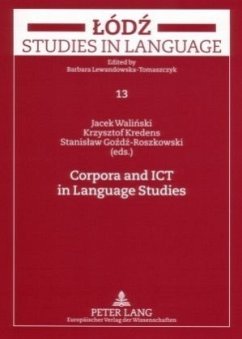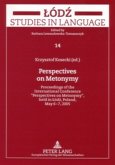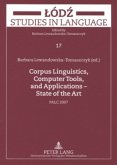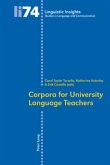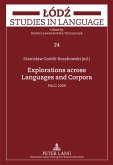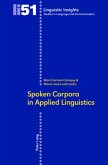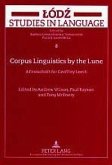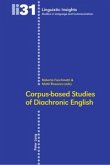Corpora and ICT in Language Studies
PALC 2005
Herausgegeben:Walinski, Jacek; Kredens, Krzysztof
Corpora and ICT in Language Studies
PALC 2005
Herausgegeben:Walinski, Jacek; Kredens, Krzysztof
- Broschiertes Buch
- Merkliste
- Auf die Merkliste
- Bewerten Bewerten
- Teilen
- Produkt teilen
- Produkterinnerung
- Produkterinnerung
Information and communication technology (ICT) has dramatically altered the world's social and economic landscape and is now gaining momentum in the realm of language studies. Corpora and ICT in Language Studies attempts to signal and document this phenomenon by bringing together twenty-nine contributions authored by both seasoned researchers and newcomers to the field. The contributions range from more traditional corpus-based or corpus-driven studies to those incorporating ICT as an integral part of their methodology. The volume includes a selection of conference papers given at PALC 2005,…mehr
Andere Kunden interessierten sich auch für
![Perspectives on Metonymy Perspectives on Metonymy]() Perspectives on Metonymy104,20 €
Perspectives on Metonymy104,20 €![Corpus Linguistics, Computer Tools, and Applications ¿ State of the Art Corpus Linguistics, Computer Tools, and Applications ¿ State of the Art]() Corpus Linguistics, Computer Tools, and Applications ¿ State of the Art164,85 €
Corpus Linguistics, Computer Tools, and Applications ¿ State of the Art164,85 €![Corpora for University Language Teachers Corpora for University Language Teachers]() Corpora for University Language Teachers115,50 €
Corpora for University Language Teachers115,50 €![Explorations across Languages and Corpora Explorations across Languages and Corpora]() Explorations across Languages and Corpora139,40 €
Explorations across Languages and Corpora139,40 €![Spoken Corpora in Applied Linguistics Spoken Corpora in Applied Linguistics]() Spoken Corpora in Applied Linguistics111,30 €
Spoken Corpora in Applied Linguistics111,30 €![Corpus Linguistics by the Lune Corpus Linguistics by the Lune]() Corpus Linguistics by the Lune71,95 €
Corpus Linguistics by the Lune71,95 €![Corpus-based Studies of Diachronic English Corpus-based Studies of Diachronic English]() Corpus-based Studies of Diachronic English89,95 €
Corpus-based Studies of Diachronic English89,95 €-
-
-
Information and communication technology (ICT) has dramatically altered the world's social and economic landscape and is now gaining momentum in the realm of language studies. Corpora and ICT in Language Studies attempts to signal and document this phenomenon by bringing together twenty-nine contributions authored by both seasoned researchers and newcomers to the field. The contributions range from more traditional corpus-based or corpus-driven studies to those incorporating ICT as an integral part of their methodology. The volume includes a selection of conference papers given at PALC 2005, the fifth conference in the biennial cycle of meetings organized by the Department of English Language at Lódz University, as well as a number of invited papers. The papers are grouped in three parts: corpora in empirical language studies, cognitive linguistics and e-learning.
Produktdetails
- Produktdetails
- Lodz Studies in Language 13
- Verlag: Peter Lang
- Artikelnr. des Verlages: 56099
- Neuausg.
- Seitenzahl: 452
- Englisch
- Abmessung: 24mm x 148mm x 210mm
- Gewicht: 590g
- ISBN-13: 9783631560990
- ISBN-10: 3631560990
- Artikelnr.: 25245228
- Herstellerkennzeichnung Die Herstellerinformationen sind derzeit nicht verfügbar.
- Lodz Studies in Language 13
- Verlag: Peter Lang
- Artikelnr. des Verlages: 56099
- Neuausg.
- Seitenzahl: 452
- Englisch
- Abmessung: 24mm x 148mm x 210mm
- Gewicht: 590g
- ISBN-13: 9783631560990
- ISBN-10: 3631560990
- Artikelnr.: 25245228
- Herstellerkennzeichnung Die Herstellerinformationen sind derzeit nicht verfügbar.
Contents : Randi Reppen/Camilla Vásquez: Using corpus linguistics to investigate the language of teacher training - Itziar Aldabe/Leire Amoros/Bertol Arrieta/Arantza Díaz de Ilarraza/Montse Maritxalar/Maite Oronoz/Larraitz Uria: Learner and error corpora based computational systems - Renata Fox: Participating in the transdisciplinary project: applying corpus linguistics to corporate identity - Jacek Walinski/Piotr Pezik: Web access interface to the PELCRA referential corpus of Polish - Daniel Janus/Adam Przepiórkowski: POLIQARP 1.0: some technical aspects of a linguistic search engine for large corpora - Jakub Fast/Adam Przepiórkowski: Automatic extraction of Polish verb subcategorization. An evaluation of common statistics - Sylvana Krausse: Findings from a corpus-informed study of environmental engineering English - Magali Paquot: Towards a productively-oriented academic word list - Piotr Pezik: Lexis, the lexicon, terms, idioms and co-occurrence statistics - a case study - Stanislaw Gozdz-Roszkowski: Pattern and meaning in judicial argumentation. An exploratory study - Adam Bednarek: Methodology of data collection - Canadianisms in metropolitan Toronto - Anna Kaminska: Contrastive study of Old English and Old High German grammar: a corpus-based analysis of a fragment of The Battle of Maldon, Hildebrandslied and Ludwigslied - Magdalena Turska/Natalia Kotsyba: POLUKR - Polish-Ukrainian parallel corpus (a project) - Wieslaw Babik: Keywords in information retrieval systems on the internet - Janusz Badio: Designing a data-base for spoken discourse analysis - Katarzyna Dziwirek/Barbara Lewandowska-Tomaszczyk: Corpus-based analysis of emotion predicates fear, worry , and joy in Polish and English - Cecília Fróis/Belinda Maia/Arnaldo Videira: A case of meaning extension - Thomas Egan: The prototypical meaning of the -ing complement form - Steve Legrand: The use of basic-level categories and their relation to idealized cognitive models in word sense disambiguation - John Newman/Jingxia Lin: The purposefulness of going: a corpus-linguistic study - Agnieszka Kaleta: A corpus based research into metaphor - what do we gain - F.G.F. Schulte: The effectiveness of moodle as an instrument to assist e-coaches and career switchers in mastering and refining their professional competencies as e-coaches and as teachers - John Osborne: Why do they keep making the same mistakes? Evidence for error motivation in a learner corpus - Agnieszka Lenko-Szymanska: The role of L1 influence and L2 instruction in the choice of rhetorical strategies by EFL learners - Kanyarat Getkham: The effects of using the multimedia computer program on vocabulary acquisition and retention - Somsak Boonsathorn: C-tests revisited: a validation of Semantic/Syntactic Tests (S-Tests) for advanced students - Mousa A. Btoosh: Lexical complexity and frequency in L1 and L2 students' writing: a computer corpus linguistics approach - Richard Profozich/Tomasz Pludowski: Towards e-learning? Strategies for successful online education at University of Maryland University College - Jacek Walinski: Monitoring e-learners' feedback with blogs.
Contents : Randi Reppen/Camilla Vásquez: Using corpus linguistics to investigate the language of teacher training - Itziar Aldabe/Leire Amoros/Bertol Arrieta/Arantza Díaz de Ilarraza/Montse Maritxalar/Maite Oronoz/Larraitz Uria: Learner and error corpora based computational systems - Renata Fox: Participating in the transdisciplinary project: applying corpus linguistics to corporate identity - Jacek Walinski/Piotr Pezik: Web access interface to the PELCRA referential corpus of Polish - Daniel Janus/Adam Przepiórkowski: POLIQARP 1.0: some technical aspects of a linguistic search engine for large corpora - Jakub Fast/Adam Przepiórkowski: Automatic extraction of Polish verb subcategorization. An evaluation of common statistics - Sylvana Krausse: Findings from a corpus-informed study of environmental engineering English - Magali Paquot: Towards a productively-oriented academic word list - Piotr Pezik: Lexis, the lexicon, terms, idioms and co-occurrence statistics - a case study - Stanislaw Gozdz-Roszkowski: Pattern and meaning in judicial argumentation. An exploratory study - Adam Bednarek: Methodology of data collection - Canadianisms in metropolitan Toronto - Anna Kaminska: Contrastive study of Old English and Old High German grammar: a corpus-based analysis of a fragment of The Battle of Maldon, Hildebrandslied and Ludwigslied - Magdalena Turska/Natalia Kotsyba: POLUKR - Polish-Ukrainian parallel corpus (a project) - Wieslaw Babik: Keywords in information retrieval systems on the internet - Janusz Badio: Designing a data-base for spoken discourse analysis - Katarzyna Dziwirek/Barbara Lewandowska-Tomaszczyk: Corpus-based analysis of emotion predicates fear, worry , and joy in Polish and English - Cecília Fróis/Belinda Maia/Arnaldo Videira: A case of meaning extension - Thomas Egan: The prototypical meaning of the -ing complement form - Steve Legrand: The use of basic-level categories and their relation to idealized cognitive models in word sense disambiguation - John Newman/Jingxia Lin: The purposefulness of going: a corpus-linguistic study - Agnieszka Kaleta: A corpus based research into metaphor - what do we gain - F.G.F. Schulte: The effectiveness of moodle as an instrument to assist e-coaches and career switchers in mastering and refining their professional competencies as e-coaches and as teachers - John Osborne: Why do they keep making the same mistakes? Evidence for error motivation in a learner corpus - Agnieszka Lenko-Szymanska: The role of L1 influence and L2 instruction in the choice of rhetorical strategies by EFL learners - Kanyarat Getkham: The effects of using the multimedia computer program on vocabulary acquisition and retention - Somsak Boonsathorn: C-tests revisited: a validation of Semantic/Syntactic Tests (S-Tests) for advanced students - Mousa A. Btoosh: Lexical complexity and frequency in L1 and L2 students' writing: a computer corpus linguistics approach - Richard Profozich/Tomasz Pludowski: Towards e-learning? Strategies for successful online education at University of Maryland University College - Jacek Walinski: Monitoring e-learners' feedback with blogs.

